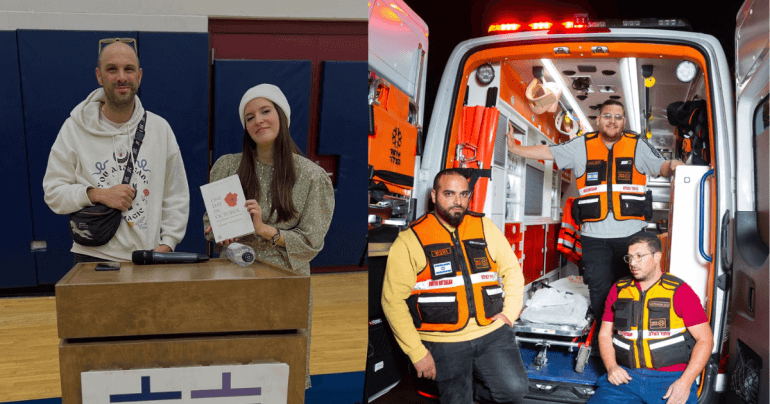
The Divine Providence of That One Day in October
In a twist of hashgacha pratis (divine providence) almost too perfect to script, a bestselling Israeli book and a new HBO anthology drama share the same name — One Day in October — yet were created entirely independently. Both tell the stories of October 7, and in particular, that of Ambulance 54.
On that horrific day, as Hamas terrorists stormed Israel’s southern border, three United Hatzalah volunteers, Emanuel Sakat, Avi Gian, and Avi Yudkowsky, unarmed EMTs from across Israel, drove straight into the line of fire, pulling dozens of people to safety.
Before this unbelievable story, and others like it, reached the screen, it appeared in print. One Day in October: Forty Heroes, Forty Stories, the Hebrew book published just months after the attacks, is also the story of its two authors, and the unlikely partnership that made it possible.
When filmmaker and author Yair Agmon was first asked to collect testimonies from the heroes of October 7 for a book, he refused. He had spent days watching unbearable footage on Telegram. “After these videos, I was broken to pieces,” he recalled. “My plan for the world was only to cry.”
Then Oriya Mevorach, an editor-in-chief at Koren Publishers, persuaded him to try one interview: a man who rescued nine people from the Nova festival. “After reading one page of the transcript,” Yair said, “I sent Oriya a message: ‘I’m in.’ I realized this isn’t a sad story at all. I realized that I want to spend time with this guy. And I realized that this is the healing I need — to be with them.”
From that moment, the two became inseparable collaborators — a creative shidduch of opposites. “He’s left-wing, I’m right-wing,” Oriya said. “He’s ex-religious, I’m religious. And yet we had almost no arguments. Because everyone is human, and this book is about humanism.”
Their partnership mirrored what they were documenting: Jews from across divides uniting to save each other. “Yair focuses on the human aspect of the stories,” Oriya explained. “He can see the details and the details excite him. I love the action-movie stories. I can see the hashgacha in all of them.”
Among the book’s forty stories, Ambulance 54 stood out. On the morning of Simchat Torah, Sakat, Gian, and Yudkowsky received a call instructing them to head to the Heletz Junction—outside the line of fire—to evacuate wounded soldiers being transferred there. Because it was Shabbat, they refused to turn on the radio, leaving them unaware of the magnitude of the attacks unfolding in the south.
When they arrived, they saw that too many wounded were still trapped inside the combat zone. Ignoring orders, the three crossed into danger, risking their lives again and again and ultimately saving 60 people.
What carried them through was their bitachon (trust in Hashem). “God was watching over us; God was with us the whole time,” they later said. “The Sabbath protected us.” After Shabbat, as they continued rescuing the wounded, they played Motty Weiss’s “You Don’t Ask Questions About Father” on repeat. For Yair, who calls himself an atheist, their faith was unmistakable. “Even though I don’t believe in God, they definitely believe… God was with them that day. It’s a miracle they survived. It’s a miracle they saved so many lives.”
Oriya saw that miracle differently. “Hashem chose a side, and He was on our side,” she said. “You can see He’s with the good guys, helping them.”
But to her, whether the heroes themselves experienced Hashem’s presence isn’t what matters. “It’s not about what the hero felt,” she said. “It’s what the reader feels. When you see the pieces fit together — when you realize they shouldn’t have survived but did — you see Hashem.”
Her words recall Megillat Esther, a story where God’s name never appears, yet His presence is unmistakable. In One Day in October, too, God’s hand is hidden between the lines — not declared, but revealed through what unfolds.
For Oriya, the miracles were everywhere, but what moved her most was the unity. As Ambulance 54 sped south, they saw car after car doing the same—civilians and soldiers alike risking their lives to save strangers. “Imagine that,” she said. “People who don’t even know you, passing red lights just to help you. Being part of this people, this family, it’s not to be taken for granted.”
Yair was struck by the same scene from another angle. “My grandfather’s parents were sent to Auschwitz. But this is not the same story: We are not waiting for the Nazis to kill us. We are standing against it.”
Two weeks before the book went to print, Yair warned Oriya, “This won’t be a success.” But it went on to sell nearly 100,000 copies in Israel. “It’s a miracle,” Oriya said. And now, through both the book and the new HBO series of the same name, countless more people know the stories of these extraordinary heroes from that one fateful day in October.
For both authors, the project was deeply personal. “The book saved our souls,” Oriya reflected, as Yair called it a “salvation.” That, perhaps, is the greatest hashgacha of all: that two writers from opposite ends of Israel’s spectrum met in the middle of its darkest hour to tell the stories that prove Am Yisrael Chai.
And that somewhere, on a road lit by flashing sirens, three men in an ambulance heading into the inferno showed the world exactly what that means.
If you found this content meaningful and want to help further our mission through our Keter, Makom, and Tikun branches, please consider becoming a Change Maker today.







